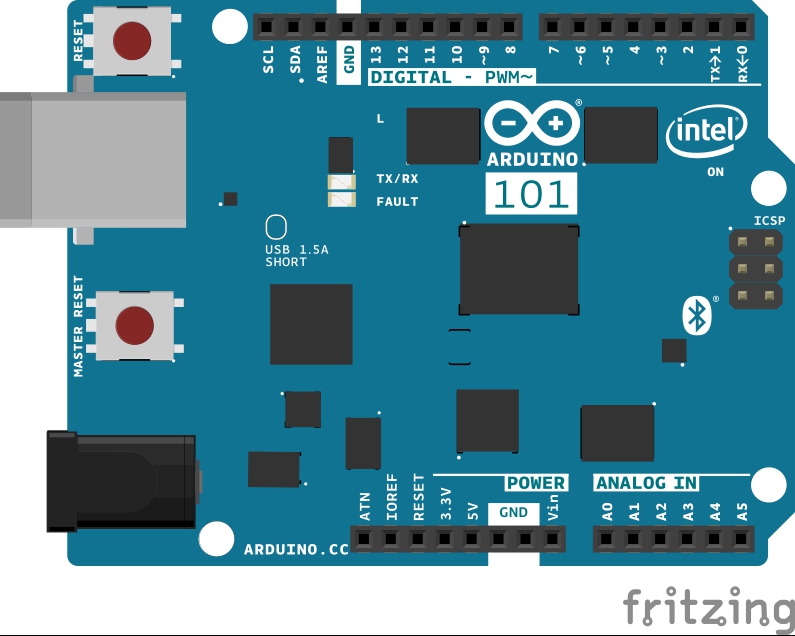Eğitimler
Genuino101CurieIMURawImuDataSerial
Bu öğreticide ivmeölçer ve jiroskoptan tüm ham veri setini okudunuz. Kullanılan işlev altı değeri birlikte okur, ancak sensörün tek bir sensörünü veya tek bir eksenini okumak için belirli fonksiyonlar vardır.
Gerekli Donanım
Devre

Bu öğreticiyi kullanmak için ek donanıma gerek yoktur.
Yazılım Temelleri
Kütüphaneler
CurieIMU .h, 101 anakartın IMU yongasının tüm parametrelerine, özelliklerine ve okumalarına erişim sağlayan kütüphanedir. Bu ünite üç eksenli ivmeölçer ve üç eksenli jiroskop içerir. Bu kütüphane, 101 kart çekirdeğinin bir parçasıdır ve Arduino veya Genuino 101 için çekirdek dosyalarla birlikte yüklenir. Bu öğreticide, readMotionSensor işleviyle hareket sensöründen tüm veri setini okuyoruz .
Fonksiyonlar
Yok
Kod
Sensörlerin, kartın gerçek konumu ile ilgili ham verileri elde etmek için kalibrasyona ihtiyacı olabilir. Bunu başarmak için bu satırı int calibrateOffsets = 1; int calibrateOffsets = 0; ve kartı yukarı doğru bakacak şekilde düz bir yüzeye yerleştirin. Seri monitörde ofset kalibrasyonundan önce ve sonra kalibrasyondan sonra sensör çıkışını göreceksiniz. Tahtayı hareket ettirmezseniz ham verilerin okunması sıfıra yakın olmalıdır, Z olan üçüncü değer hariç, +/- 2G aralığı için 1g olan 16767'ye eşit veya yakın.
===============================================
Example sketch for CurieIMU library for Intel(R) Curie(TM) devices.
Copyright (c) 2015 Intel Corporation. All rights reserved.
Based on I2C device class (I2Cdev) demonstration Arduino sketch for MPU6050
class by Jeff Rowberg: https://github.com/jrowberg/i2cdevlib
===============================================
I2Cdev device library code is placed under the MIT license
Copyright (c) 2011 Jeff Rowberg
Permission is hereby granted, free of charge, to any person obtaining a copy
of this software and associated documentation files (the "Software"), to deal
in the Software without restriction, including without limitation the rights
to use, copy, modify, merge, publish, distribute, sublicense, and/or sell
copies of the Software, and to permit persons to whom the Software is
furnished to do so, subject to the following conditions:
The above copyright notice and this permission notice shall be included in
all copies or substantial portions of the Software.
THE SOFTWARE IS PROVIDED "AS IS", WITHOUT WARRANTY OF ANY KIND, EXPRESS OR
IMPLIED, INCLUDING BUT NOT LIMITED TO THE WARRANTIES OF MERCHANTABILITY,
FITNESS FOR A PARTICULAR PURPOSE AND NONINFRINGEMENT. IN NO EVENT SHALL THE
AUTHORS OR COPYRIGHT HOLDERS BE LIABLE FOR ANY CLAIM, DAMAGES OR OTHER
LIABILITY, WHETHER IN AN ACTION OF CONTRACT, TORT OR OTHERWISE, ARISING FROM,
OUT OF OR IN CONNECTION WITH THE SOFTWARE OR THE USE OR OTHER DEALINGS IN
THE SOFTWARE.
===============================================
*/
#include "CurieIMU.h"
int ax, ay, az; // accelerometer values
int gx, gy, gz; // gyrometer values
const int ledPin = 13; // activity LED pin
bool blinkState = false; // state of the LED
int calibrateOffsets = 1; // int to determine whether calibration takes place or not
void setup() {
Serial.begin(9600); // initialize Serial communication
while (!Serial); // wait for the serial port to open
// initialize device
Serial.println("Initializing IMU device...");
CurieIMU.begin();
// verify connection
Serial.println("Testing device connections...");
if (CurieIMU.begin()) {
Serial.println("CurieIMU connection successful");
} else {
Serial.println("CurieIMU connection failed");
}
// use the code below to calibrate accel/gyro offset values
if (calibrateOffsets == 1) {
Serial.println("Internal sensor offsets BEFORE calibration...");
Serial.print(CurieIMU.getAccelerometerOffset(X_AXIS));
Serial.print("\t"); // -76
Serial.print(CurieIMU.getAccelerometerOffset(Y_AXIS));
Serial.print("\t"); // -235
Serial.print(CurieIMU.getAccelerometerOffset(Z_AXIS));
Serial.print("\t"); // 168
Serial.print(CurieIMU.getGyroOffset(X_AXIS));
Serial.print("\t"); // 0
Serial.print(CurieIMU.getGyroOffset(Y_AXIS));
Serial.print("\t"); // 0
Serial.println(CurieIMU.getGyroOffset(Z_AXIS));
// To manually configure offset compensation values,
// use the following methods instead of the autoCalibrate...() methods below
//CurieIMU.setAccelerometerOffset(X_AXIS,495.3);
//CurieIMU.setAccelerometerOffset(Y_AXIS,-15.6);
//CurieIMU.setAccelerometerOffset(Z_AXIS,491.4);
//CurieIMU.setGyroOffset(X_AXIS,7.869);
//CurieIMU.setGyroOffset(Y_AXIS,-0.061);
//CurieIMU.setGyroOffset(Z_AXIS,15.494);
Serial.println("About to calibrate. Make sure your board is stable and upright");
delay(5000);
// The board must be resting in a horizontal position for
// the following calibration procedure to work correctly!
Serial.print("Starting Gyroscope calibration and enabling offset compensation...");
CurieIMU.autoCalibrateGyroOffset();
Serial.println(" Done");
Serial.print("Starting Acceleration calibration and enabling offset compensation...");
CurieIMU.autoCalibrateAccelerometerOffset(X_AXIS, 0);
CurieIMU.autoCalibrateAccelerometerOffset(Y_AXIS, 0);
CurieIMU.autoCalibrateAccelerometerOffset(Z_AXIS, 1);
Serial.println(" Done");
Serial.println("Internal sensor offsets AFTER calibration...");
Serial.print(CurieIMU.getAccelerometerOffset(X_AXIS));
Serial.print("\t"); // -76
Serial.print(CurieIMU.getAccelerometerOffset(Y_AXIS));
Serial.print("\t"); // -2359
Serial.print(CurieIMU.getAccelerometerOffset(Z_AXIS));
Serial.print("\t"); // 1688
Serial.print(CurieIMU.getGyroOffset(X_AXIS));
Serial.print("\t"); // 0
Serial.print(CurieIMU.getGyroOffset(Y_AXIS));
Serial.print("\t"); // 0
Serial.println(CurieIMU.getGyroOffset(Z_AXIS));
}
// configure Arduino LED for activity indicator
pinMode(ledPin, OUTPUT);
}
void loop() {
// read raw accel/gyro measurements from device
CurieIMU.readMotionSensor(ax, ay, az, gx, gy, gz);
// these methods (and a few others) are also available
//CurieIMU.readAcceleration(ax, ay, az);
//CurieIMU.readRotation(gx, gy, gz);
//ax = CurieIMU.readAccelerometer(X_AXIS);
//ay = CurieIMU.readAccelerometer(Y_AXIS);
//az = CurieIMU.readAccelerometer(Z_AXIS);
//gx = CurieIMU.readGyro(X_AXIS);
//gy = CurieIMU.readGyro(Y_AXIS);
//gz = CurieIMU.readGyro(Z_AXIS);
// display tab-separated accel/gyro x/y/z values
Serial.print("a/g:\t");
Serial.print(ax);
Serial.print("\t");
Serial.print(ay);
Serial.print("\t");
Serial.print(az);
Serial.print("\t");
Serial.print(gx);
Serial.print("\t");
Serial.print(gy);
Serial.print("\t");
Serial.println(gz);
// blink LED to indicate activity
blinkState = !blinkState;
digitalWrite(ledPin, blinkState);
}
